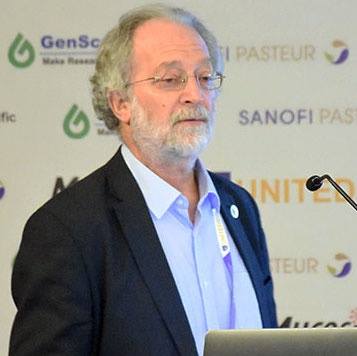Yang N, Sen P,. The senescent cell epigenome. Aging (Albany NY). 2018; 10:3590–3609. https://doi.org/10.18632/aging.
Copy or Download citation:
Select the format you require from the list below.
Yang N, Sen P,. The senescent cell epigenome. Aging (Albany NY). 2018; 10:3590–3609. https://doi.org/10.18632/aging.
Copy or Download citation:
Select the format you require from the list below.

“Graham is another speaker who has been a key member of the “SENS family” since its earliest days. He is one of the few eminent biogerontologists who can proudly claim to have spoken out regularly in favour of intervention in aging during the dark days when such talk was widely viewed by colleagues as misguided or even irresponsible. He continues to be a world leader in the study of immunosenescence, elucidating key aspects of why older people are so bad at fighting off infections, and I’m really looking forward to hearing his latest findings.” says Aubrey de Grey.
https://www.undoing-aging.org/news/dr-graham-pawelec-to-spea…aging-2019

Antibiotics have emerged as potentially lifespan-enhancing drugs, according to the results of new research carried out in the UK.
Genetic experiments that eliminate “senescent” cells – older cells, which lose the ability to divide – have already been proven to alleviate age-related dysfunction in model organisms.
Now, scientists have shown for the first time that an FDA-approved antibiotic – Azithromycin – can effectively target and eliminate senescent cells in culture.

Tau protein aggregation is associated with cellular senescence in the brain is the topic for the November Journal Club. This is an important paper as it shows how senescent cells contribute to Alzheimer’s disease and how removing them appears to improve the condition. We will see you live on our Facebook page at 13:00 EST for the Journal Club show with Dr. Oliver Medvedik.
Abstract
Tau protein accumulation is the most common pathology among degenerative brain diseases, including Alzheimer’s disease (AD), progressive supranuclear palsy (PSP), traumatic brain injury (TBI), and over twenty others.

Today, we want to point out a new study showing how senescent cells poison their healthy neighbors and that the more there are, the faster they make other cells become senescent.
What are senescent cells?
As you age, increasing numbers of your cells enter into a state known as senescence. Senescent cells do not divide or support the tissues of which they are part; instead, they emit a range of potentially harmful chemical signals that encourage nearby healthy cells to enter the same senescent state, which is known as the “bystander effect”. Their presence causes many problems: they reduce tissue repair, increase chronic inflammation, and can even eventually raise the risk of cancer and other age-related diseases.
Very good tidbits here. Especially happy about Aubrey talking about the myth of overpopulation.
Why do we need research on longevity? Interview with Aubrey de Grey (SENS) at the EHA 2018 in Brussels. We talk about anti-aging and the latest scientific research to increase our longevity.
🚀 Want to know more:
https://superhumantalks.com (ENG)
https://peterjoosten.net/anti-aging (NL)
💯 Subscribe to my channel:
https://peterjoosten.net/youtube
📩 Subscribe to my Superhuman Talks newsletter:

The posthuman search for ‘actual’ eternal life seems the opposite of the argument of this unhelpful book, imo https://thewastedworld.wordpress.com/2018/11/24/dissolution-decay/ https://paper.li/e-1437691924
In closing, I wish to make some final remarks on the purpose of theorising a Posthuman Gothic. Far from being the joyous celebration of vitality, agency, and connection most touted by its proponents, under the Gothic sign the Posthuman takes on a far more ambivalent character. The Gothic looks to a world beyond us—even without us, or at least not for us—and so without knowing it, the Posthuman and the Gothic are already intertwined. Both look outside the human to the weird amalgamations of body and machine, spirit and dirt, and the eerie influences of systems far greater than we may know. The Posthuman project is twisted up not only in Gothic categories and aesthetics, but Gothic commitments: it displays a mixed fascination with the spectres of the past while looking to a future wrenched free from the decayed laws of the dead.
The Posthuman Gothic stands at a crossroads. On the one hand it sees the deep past emerging into the near future, as circuits of matter, whether technological or earthly, put to rest the myth of the autonomous human subject. On the other, it balances the experience of utter privation and dehumanisation with the escape from human finitude. Two angles arch away from the human, into that liminal space occupied by the Gothic, which keeps one foot grounded in the human, while the other hangs over the precipice. In short, the Posthuman Gothic makes known its haunting by a human past to better cast itself into futures more or less joyous, and more or less terrifying. Here the mixed feelings of the Gothic seep through the framework of the Posthuman. The Posthuman Gothic recognises that “there is an enjoyment in seeing the familiar and the conventional become outmoded,” and that it is only in the death of the present that other futures may be imagined (Fisher 2016, 13).
Bibliography.

Today, we want to highlight a study that shows the link between atherosclerosis and the age-related shrinking of the thymus, which is arguably the most important organ of the immune system [1].
The adaptive and innate immune systems and atherosclerosis
The thymus is essentially like an army base where new T cells develop and are trained to become the soldiers of the adaptive immune system. However, as we age, the thymus shrinks, its ability to train new T cells declines, and the immune cell-producing tissue turns to fat and slowly wastes away; this process is known as thymic involution.

The gap between the life expectancy of the richest and poorest sectors of society in England is increasing, according to new research from Imperial College London.
The research, published in the journal Lancet Public Health, also reveals that the life expectancy of England’s poorest women has fallen since 2011, in what researchers say is a “deeply worrying” trend.
The study, funded by the Wellcome Trust, analysed Office for National Statistics data on all deaths recorded in England between 2001 and 2016—7.65 million deaths in total.